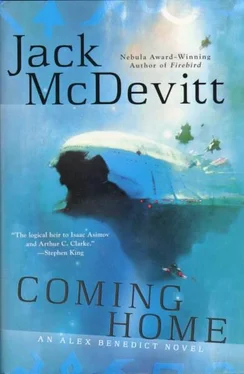“We’re about forty minutes out,” I told them. “How many of you are there?”
“Nineteen.”
“We can only take ten.”
“We know that. They told us. There’s somebody else coming in behind you.”
By then we’d heard that another forty people had been rescued from the Capella . And that the Silverton was approaching it, as well as another yacht. The Silverton was a transport and would be able to accommodate almost two hundred passengers. Of course, the critical news was that the Capella , then nearing the end of her fifth day, was still on the surface.
I couldn’t resist trying for Gabe. “You don’t by any chance have anyone named Benedict on board, do you?”
I heard Harley asking, heard the silence.
“Negative,” he said. “Sorry.”
“That’s okay. It was a long shot.”
We also received an update from John Kraus: “So you’re aware: Robert Dyke managed the fix. He describes it as temporary but says it will probably hold. There’s no way to be certain, though. So time is still of the essence. We have a sufficient number of vehicles coming in, but we’ll need at least another two days to get everyone off. We appreciate the efforts of everybody who has helped. If you need to reach me, I’m on the Heyman .”
Lifeboat 11 gradually brightened. It took shape, and we could make out individual lights, some on the hull, others in the cabin. “Can we do anything to help?” asked Harley.
“Just sit tight. We’ll take care of everything.”
They were coming in our general direction, and we’d been braking for almost two hours. “Chase,” said Belle, “I see the backup yacht.”
“When will they be here?”
“In another hour.”
And Harley again: “Do you guys know what happened? Is it really 1435 ?”
“Yes, Case. The Capella got caught in a time warp.”
“But we’ve only been on board a few days.”
“Sit tight, Case,” I said. “We’ll have you guys off in ten minutes.”
* * *
We drew alongside. When we were in position, Belle signaled the lifeboat, and the connecting tube activated. It expanded across the approximately forty meters separating us and used its magnets to secure itself to our airlock. “Everything’s in place,” Belle said.
I opened both hatches. The tube was flexible, so I couldn’t see all the way across. “Okay, Case,” I said. “You can send your people through the airlock. Ten of them. If you can, try to keep families together.”
“Of course,” he said. “They’ll be right over.”
* * *
They came into the passenger cabin, looking tired and frightened. There were three elderly couples, one with two kids, a boy and a girl, both about twelve or thirteen. They told us they’d decided to take the grandchildren for a “space ride.” “Bob and Mary must be frantic,” they said. The parents, I assumed.
The other two passengers were both women, traveling alone. One, whose name was Sally, had been headed to the City on the Crag to join her journalist husband, who’d been working on a documentary. “I haven’t been able to reach him,” she told us. “I’ve no idea even how to begin.”
The other, Juanita, had been on a business trip and appeared to be in a state of near shock. “I can’t believe I’ve lost eleven years,” she said.
We got everybody situated as soon as they were on board. I told them we’d be belting down shortly and that we’d stay that way for about forty minutes. Alex played the engaging host while I went onto the bridge and got us disconnected, talked briefly with the incoming yacht that would take off the rest of the people on the lifeboat, and said good-bye to Case Harley, who’d stayed behind. Then, finally, we were ready to move. Alex gave his cabin over to the two kids though one of them came up to sit with me on the bridge. When everyone was settled, we pulled away and began to accelerate.
I overheard some of the conversation as we moved out of the area, how glad they were to be off the lifeboat, while one of the women mentioned it was the same thing they’d said as they left the Capella .
“I’ll sue their pants off,” said one of the men in an angry voice.
“Well, I’ll tell you one thing,” said another male, “I’m never getting on one of those damned things again.”
It didn’t much matter who was speaking; the comments were all the same, how their children were now in their forties or fifties, whether Aunt Lucy was still alive, what had happened to their homes, how hard it was to believe that Janet would now be fourteen, for heaven’s sake.
One of them, a tall, worried-looking male, demanded assurances that when we made our jump, we wouldn’t get stuck again. When I told him it would be okay, he asked how I could be certain.
“We have a different kind of drive,” I said. “Besides, we’re nowhere near the time/space area that’s damaged.”
He stared at me. “Don’t get me wrong,” he said, “but I wish I could believe you.”
Finally, we made our descent into transdimensional space, and they were all free to walk around again. That was when we started hearing more details of their experience. “You don’t want to be out here and get told you need to be rescued,” said one of the older women. “They kept telling us everything would be okay, that there was no reason to worry, and that just scared me to death.”
The girl, whose name was Rinnie, told me, under her breath, that the woman scared pretty easily.
Mostly what I picked up was simply disbelief that eleven years had passed since they boarded. Sally looked terrified. “My husband thinks I’ve been dead for eleven years,” she said. “He’s probably married again.”
“There’s just no way to know for sure,” said Alex, in his most soothing tone. “But we’ve been aware of what happened for several years, and that the passengers figured to be okay.” He looked around at the others. “If you want to send transmissions, let everybody at home know you’re all right, you can do that, and we’ll send them onto the station as soon as we get back into linear space.”
In the end, everybody prepared at least one message. Even the kids, who recorded comments and assurances to friends and relatives and, in one case, a teacher.
* * *
We got to know each other pretty well on the way home. We exchanged contact information, talked about getting together, watched while a grandmother tried to explain to the kids that their friends were all now adults. “That doesn’t mean they won’t still be your friends,” she said. “But things will be different.”
Both children said no, they couldn’t believe it. “Mike will always be there.”
I felt sorry for them. I tried to imagine how I’d have felt to lose all my friends when I was twelve. To know they were still around but not really.
Rinnie spent a lot of time with me on the bridge. She was struck by how dark it was outside and that there were no stars. She talked with Belle, who blinked and booped for her, making her laugh. “One day,” she said, “I’d like to be a pilot. Like you, Chase.”
“You’d enjoy it,” I said.
Her brother eventually joined her and told me the same thing. Their grandfather followed him through the hatch and wanted to move him away. “You’re bothering the pilot, kids,” he said. “Leave her alone.” Of course, the truth was that the only reason I was even sitting on the bridge was that there was no room in the passenger cabin.
Of the other two couples, one was on their first off-world vacation, which they assured me, despite everything, they would try again as soon as they could get their lives back together. The other pair were returning home to Sanusar after a tour that had taken them to Earth. “Always wanted to see it,” they said.
Читать дальше












